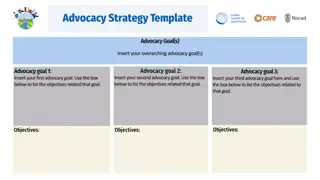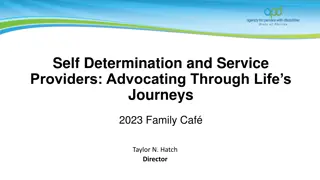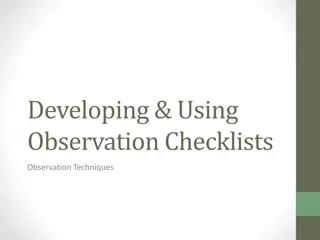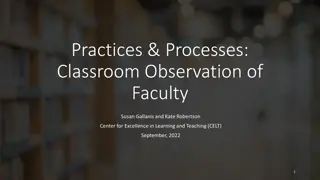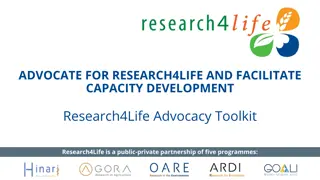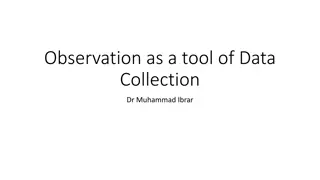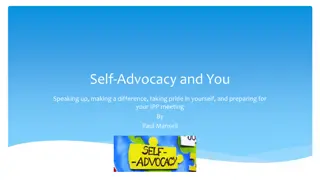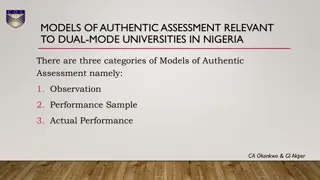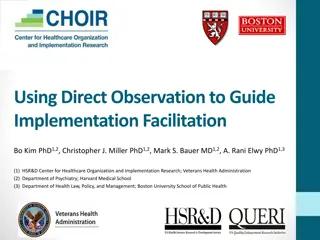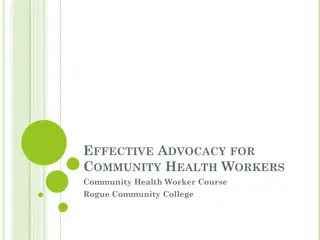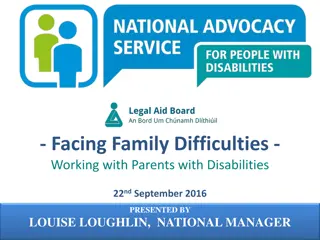Empowering Teachers Through Self-Advocacy in Observation Cycles
Self-advocacy is essential for teachers during observation cycles to showcase their strengths, address growth areas, and ensure fair evaluations. This content delves into the importance of self-advocacy, ways for teachers to advocate for themselves effectively, and the elements of the observation cycle designed for professional growth and development.
Download Presentation

Please find below an Image/Link to download the presentation.
The content on the website is provided AS IS for your information and personal use only. It may not be sold, licensed, or shared on other websites without obtaining consent from the author.If you encounter any issues during the download, it is possible that the publisher has removed the file from their server.
You are allowed to download the files provided on this website for personal or commercial use, subject to the condition that they are used lawfully. All files are the property of their respective owners.
The content on the website is provided AS IS for your information and personal use only. It may not be sold, licensed, or shared on other websites without obtaining consent from the author.
E N D
Presentation Transcript
UNIT -IV ATTENDING
HELPING Gerard Egan, whose book The Skilled Helper (first published in 1975) did much to arouse the interest in helping within the counselling arena, has argued that it involves two basic goals. Each of these is based in the needs of the person seeking help. The first relates to those they are helping to manage specific problems. It is to help clients manage their problems in living more effectively and develop unused or underused opportunities more fully (1998: 7). The second helping goal looks to their general ability to manage problems and develop opportunities. It is to help clients become better at helping themselves in their everyday lives (Egan 1998: 8).
HELPERS Helpers are concerned with learning, relationship and working with people to act on their understandings. However, they also step over into the world of counselling. They do this by being experienced as a particular kind of person and drawing upon certain skills, not by taking on the persona of counsellor (British Association for Counselling and Psychotherapy 2002; Higson 2004). Counselling entails a more formalized relationship than what we are talking about as helping; and is based in a specific set of traditions of thinking and practice.
The helping person caring, committed and wise To reword Parker Palmer (2000: 11) good helping is rather more than technique; it comes from the identity and integrity of the helper (Parker Palmer was talking about teaching). This means that helpers both need to know themselves, and seek to live life as well as they can. They need to be authentic.
Compassion In Zen and the Art of Helping David Brandon argued that The real kernel of all our help, that which renders it effective, is compassion (1990: 6).
Caring caring about and caring for . Caring-for someone, involves sympathy feeling with. It also entails being open to what the other person is saying and might be experiencing and reflecting upon it. Carers have to respond to the cared-for in ways that are, hopefully, helpful. For this to be called caring a further step is needed. There must also be some realization on the part of the cared-for that an act of caring has occurred. Caring involves connection and relationship between the carer and the cared-for, and a degree of reciprocity. Both gain from the relationship in different ways and both give (see Smith 2004).
Caring-about is more abstract. When we talk about caring-about it usually involves something more indirect than the giving immediate help to someone. For example, we may care-about the suffering of those in poor countries. In this we are concerned about their plight. This may lead to us wanting to do something about it but the result is rarely care-for.
Wisdom Smith and Smith (2008: 57-69) have argued that helpers need to cultivate wisdom both in themselves and those they help. It is quality which especially attracts people to them for help. It generally means that the person so labelled is seen as having a deep understanding, a regard for truth, and an ability to come to sound judgements.
THE SKILLED HELPER - STAGES The Egan Skilled Helper approach encourages clients to become active interpreters of the world, giving meanings to actions, events and situations, facing and overcom-ing challenges, exploring problem issues, seeking new opportunities and establishing goals. Quite simply, success usually comes when human beings become active in initiating positive behaviours and developing problem-solving strategies.
STAGE I :Active Listening & Empathy Active Listening is a key skill for the Skilled Helper. It consists in concentrating on the client's non-verbal and verbal communications and relating them to the client's story (non-verbal communication includes body language, expressions, reactions etc). Verbal communication articulates the client's experiences, behaviours and feelings. The Skilled Helper encourages the client to stick to the point (what is relevant), they are non-judgemental and they are Empathic rather than sympathetic. Appropriate Empathy is a state of human interaction in which the helper enters and understands the client's perspective, whilst getting in touch with their thoughts and feelings, however, in this the helper remains rational in their understanding of the client's situation and reality. Unlike in some counselling approaches, although the Skilled Helper communicates Empathy to the client as the basis of counselling, when appropriate they may also use challenging skills with the client when particular and clearly harmful irrational statements or destructive patterns etc keep resurfacing, however any challenging must be congruent with the maintenance of therapeutic Rapport and Empathy because Empathy and Rapport provide the client with the warmth, comfort and safety needed to facilitate effective positive change.
Exploring Skills Exploring the client's Existing Situation The purpose of Stage I is to build a non-threatening counselling relationship and help the client explore their situation and then focus on chosen issues. In this stage the Skilled Helper helps the client to identify and clarify problems and opportunities and assess their resources. Clients are often reluctant or resistant at this stage, therefore the therapist helps them to explore new perspectives, challenges negative modes of thinking and constructively challeng-es the client's excuses, evasiveness, distortions and negative self-statements. This stage is based around helping the client in establishing priorities and developing action plans that put into practice productive strategies. Stage I exploring skills include:
Open-ended questions Silence Focusing Empathy Paraphrasing & Reflecting Meaning Paraphrasing & Reflecting Feeling Structuring Summarising
STAGE II :Understanding Skills Helping the Client Establish Aims and Goals The purpose of Stage II is to help facilitate the client in developing a more in-depth and objective understanding of their situation. This stage is enacted as the Skilled Helper assists the client in exploring options and possible goals. The Skilled Helper establishes what the client really wants and needs and the client is encouraged to consider new possibilities and perspectives, choosing ones that are realistic, consist-ent with their values and for which there are adequate incentives. The Skilled Helper facilitates the client in developing rational decision- making based upon healthy data collection, analysis and action planning. In this state brain-storming, divergent thinking, a balance-sheet approach and force-field analysis may be used with the client in order to facilitate choices between different ways of dealing with situations and achieving goals. These techniques help the client to explore various options and strategies as well understand and work around blocking factors with facilitating factors. Stage II understanding skills include:
Recognising Patterns & Themes Alternate Frames of Reference Self-disclosure Immediacy Challenging Timing & Pacing Advanced empathy
STAGE III:Acting Skills Help the Client to Develop Strategies Stage III skills are assist clients to take appropriate action by defining goals, changing ways of relating and working through issues using problem solving or decision making methods, while providing support and encouragement. Stage III skills help the client to cope with current problems and assist in the learning of new skills that will enable them to live more effectively in the future. Action is based on exploration and understanding gained by using stage I & II skills.
In stage III the Skilled Helper facilitates the client in finding ways of achieving their goals. After helping the client to come up with as many strategies as they can the Skilled Helper then helps them to focus upon those that are viable in terms of client situation, needs, aspiration and resources. This process is designed to help the client move from the current situation to one that they would prefer. Transition experiences may make the client feel vulnerable therefore the process may often be built upon the taking of small comfortable steps as the client grows in confidence (but this must be based upon the needs of the client - some like big jumps). Realistic achievable planning and time-tabling are key to success and the Skilled Helper is warm and supportive - helping the client look out and overcome obstacles, turning challenges into opportunities and inspiring the client to mobilise their personal, social and material resources (particularly helpful family members, friends and self-help net-works etc). Stage III action skills include:
Divergent Thinking Goal Setting Decision Making Problem Solving Programme Choice Evaluate Knowledge of Resources Using Knowledge of How Behaviour is Changed Using Knowledge of How Useful Behaviour is Maintained Teaching skills & Promoting Learning skills
Evaluation In addition to Explore, Understand & Act skills evaluation of the therapy process is also important. It can take place at the end of each session as a summarization, whenever appropriate. It helps the client understand what ground they have gone over, helps them perceive progress they have made and inspires them with under-standing on how they want to move forwards.


